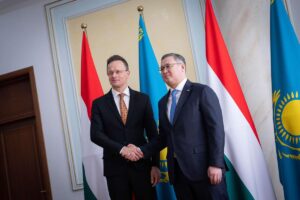ASTANA – Hungarian Minister of Foreign Affairs and Trade Péter Szijjártó outlined plans for deepening economic ties with Kazakhstan in a Feb. 17 interview with Kazinform news agency, focusing on major oil projects, cutting-edge nuclear technology, and agricultural investments.
“This cooperation is very stable because it has always been based on mutual respect. We never educated each other. We never judged each other. None of us wanted to interfere in the domestic issues of others. We always respected each other. This mutual respect is very important when it comes to the long-term predictability of a relationship. We are very positive about how we’re going to move forward, and we are very positive about the future plans,” said Szijjártó.
Energy collaboration and future oil projects

The Foreign Ministers of Kazakhstan and Hungary discussed the development of trade relations at a meeting in Astana on Feb. 17. Photo credit: Embassy of Kazakhstan in Hungary
MOL, Hungary’s largest oil and gas company, has been involved in Kazakhstan’s energy landscape. It invested $200 million in the Rozhkovskoye field in western Kazakhstan. Through five operational wells, the company has extracted over 300 million cubic meters of gas and 200,000 tons of condensate.
Building on this success, MOL aims to expand its operations by exploring new opportunities, including the Berezovsky field, which could see a collaborative project between China, Kazakhstan, and Hungary. MOL’s advanced technology and research in oil and gas exploration are pivotal for the continued success of projects such as Berezovsky, which require cutting-edge technological expertise.
Szijjártó also discussed the potential inclusion of Kazakh oil, such as KEBCO, in Hungary’s energy mix. He expressed hope for effective commercial negotiations between MOL and KazMunayGas to facilitate this collaboration.
Agricultural investment and cooperation
Agriculture is another key area of focus in bilateral cooperation. The Hungarian company UBM Group will invest $83 million in Kazakhstan to build four feed and premix production plants. Szijjártó emphasized that Hungary’s long-standing tradition in agriculture and advanced technologies would significantly contribute to the modernization of Kazakhstan’s agricultural sector.
Kazakhstan was selected for this large-scale project because of its strategic location in Central Asia, perfectly aligning with Hungary’s broader goal of strengthening economic ties in the region. The initiative to advance agricultural technologies and infrastructure in Kazakhstan is poised to create mutual economic benefits.
Nuclear energy and technological collaboration
Another priority area for cooperation is the nuclear energy sector. Hungary sees nuclear energy as a key solution for the growing global demand for electricity. In Kazakhstan, where nuclear energy development is underway, Hungary plans to contribute its expertise, notably in dry cooling technologies for nuclear power plants. These technologies can be crucial for Kazakhstan’s future nuclear energy projects, particularly in areas where water resources are limited for traditional cooling methods.
Pharmaceutical and road tolling projects
Hungary’s largest pharmaceutical company is considering establishing a manufacturing facility in Kazakhstan, potentially bringing additional investments to the country. Additionally, ongoing discussions about Hungary’s involvement in Kazakhstan’s road tolling project reflect the increasing scope of bilateral economic cooperation.
Tourism and people-to-people ties
Szijjártó highlighted the importance of strengthening people-to-people connections between Hungary and Kazakhstan. The launch of a direct air route between Shymkent and Budapest in May will significantly boost tourism between the two nations. As Hungary and Central Asia deepen their relationship, Hungarian interest in Kazakhstan’s rich cultural heritage is expected to rise.
Educational cooperation and scholarships
Educational exchanges remain a cornerstone of Hungary-Kazakhstan relations. Hungary provides 250 scholarships annually to Kazakh students under the Stipendium Hungaricum program. The number of applicants has surged, with 2,111 Kazakh students applying this year. Szijjártó also signed agreements to enhance cooperation between diplomatic academies and to continue the teaching of Hungarian at Kazakhstan’s Eurasian National University.
Looking forward, Szijjártó suggested expanding the educational cooperation further by introducing the Kazakh language and Kipchak studies at Hungarian universities.
A long-term relationship based on mutual respect
In concluding the interview, Szijjártó reflected on the stability of Hungary-Kazakhstan relations, emphasizing the mutual respect that has characterized their cooperation. With both countries focused on long-term collaboration, Hungary remains optimistic about the future of their economic, cultural, and educational ties.
During his visit, President Kassym-Jomart Tokayev awarded Szijjártó the Dostyk (Friendship) Order of the second degree for his contribution to the development of Kazakh-Hungarian relations. Both countries’ delegations reached agreements on oil supplies and joint energy projects, including test shipments of Kazakh oil to Hungary.
